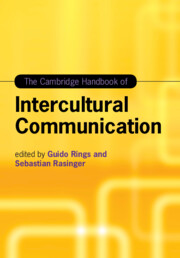Book contents
- The Cambridge Handbook of Intercultural Communication
- Cambridge Handbooks in Language and Linguistics
- The Cambridge Handbook of Intercultural Communication
- Copyright page
- Contents
- Figures
- Tables
- Contributors
- Acknowledgements
- Introduction
- Part I Introducing Intercultural Communication
- Part II Theoretical Approaches
- 5 Critical Intercultural Communication and the Digital Environment
- 6 From Shared Values to Cultural Dimensions
- 7 Towards Integrative Intercultural Communication
- 8 The Power of Literature in Intercultural Communication
- 9 Psychoanalytic Approaches to Memory and Intercultural Communication
- 10 Sociological Approaches to Intercultural Communication
- 11 Introducing Intercultural Ethics
- Part III Methods
- Part IV Application
- Part V Assessment
- Index
- References
11 - Introducing Intercultural Ethics
from Part II - Theoretical Approaches
Published online by Cambridge University Press: 18 February 2020
- The Cambridge Handbook of Intercultural Communication
- Cambridge Handbooks in Language and Linguistics
- The Cambridge Handbook of Intercultural Communication
- Copyright page
- Contents
- Figures
- Tables
- Contributors
- Acknowledgements
- Introduction
- Part I Introducing Intercultural Communication
- Part II Theoretical Approaches
- 5 Critical Intercultural Communication and the Digital Environment
- 6 From Shared Values to Cultural Dimensions
- 7 Towards Integrative Intercultural Communication
- 8 The Power of Literature in Intercultural Communication
- 9 Psychoanalytic Approaches to Memory and Intercultural Communication
- 10 Sociological Approaches to Intercultural Communication
- 11 Introducing Intercultural Ethics
- Part III Methods
- Part IV Application
- Part V Assessment
- Index
- References
Summary
Richard Evanoff’s chapter examines aspects that are key for most of the approaches mentioned above. Intercultural ethics is here defined as the process by which people from different cultures negotiate the norms that will govern relations between them at a variety of levels, including the interpersonal, intergroup and international. The chapter then discusses descriptive, normative and meta-ethical directions as three main methodological approaches to intercultural ethics, and it concludes by considering how intercultural dialogue on ethics might be conducted. In particular, Evanoff suggests that it may be possible for people from different cultures to co-create ethical norms on the basis of ‘third cultures’.
- Type
- Chapter
- Information
- The Cambridge Handbook of Intercultural Communication , pp. 187 - 202Publisher: Cambridge University PressPrint publication year: 2020
References
- 2
- Cited by

